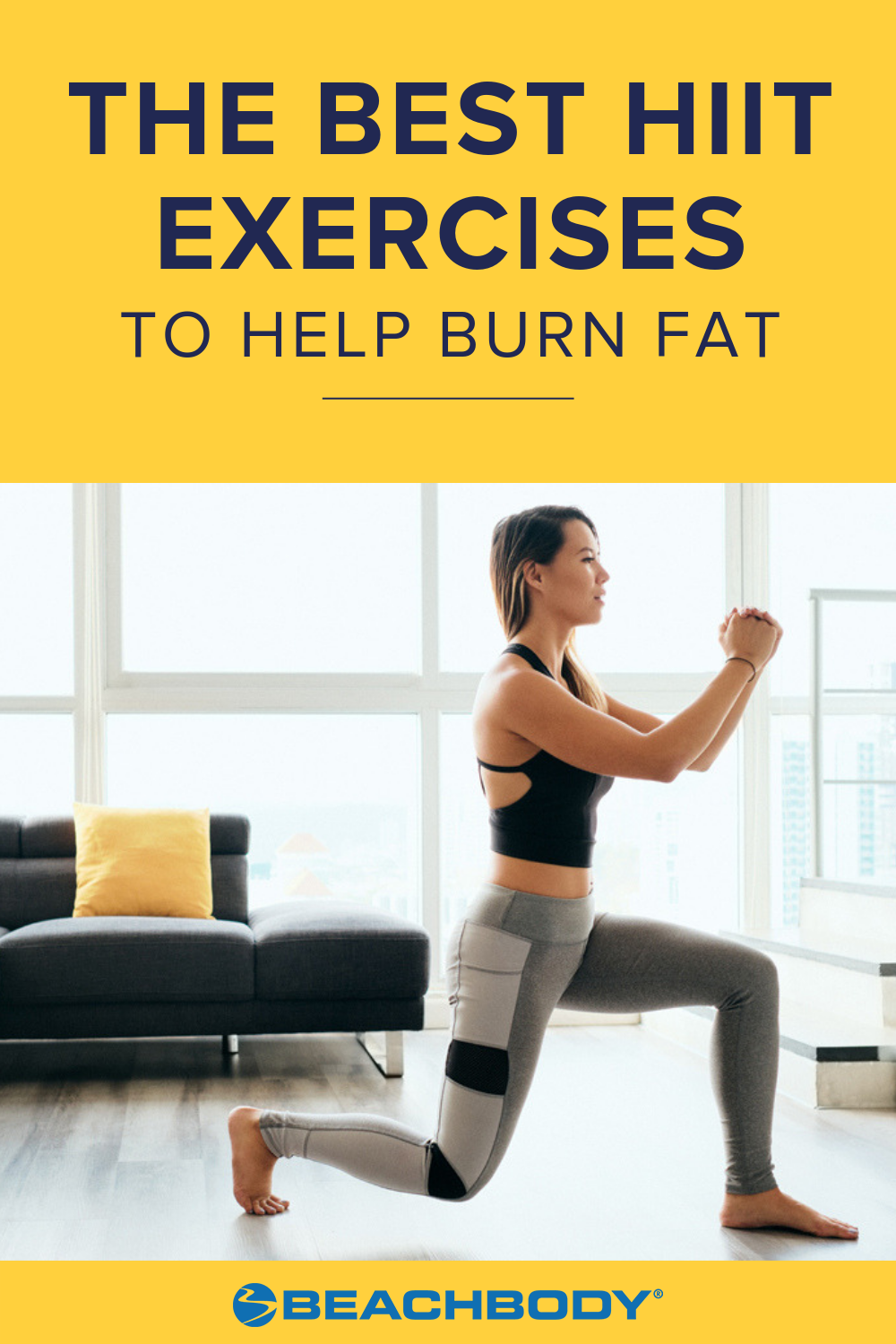The 10 Best HIIT Exercises to Help Burn Fat

Most of us want our exercise routines to be as effective, efficient, and fun as possible.
And if your goals are to shed fat and boost overall fitness and athleticism, one of the best ways to accomplish all three of those things is high-intensity interval training (HIIT).
Here’s a list of some of the best HIIT exercises to add into your workouts.
What Is HIIT?
Like the name suggests, HIIT is intense.
The typical HIIT workout involves alternating between short bursts (typically 20 to 40 seconds) of intense activity (performed at 80 to 90 percent of your maximum heart rate) with brief recovery periods.
That activity can be either cardio-based (e.g., sprints on a bike or treadmill) or encompass strength-training exercises (squat, push-up, etc.).
In the latter case, you’ll get the benefits of cardio and strength training in the same workout.
That all might sound daunting, but thankfully, HIIT workouts are also shorter than many typical strength and cardio workouts! In fact, you can get an effective HIIT workout in just 10 minutes.
While there aren’t really any exercises that are exclusively “HIIT,” there are exercises that commonly appear in HIIT workouts.
What Are the Best HIIT Exercises?
The most effective HIIT exercises are compound (multi-joint) moves that are performed at a quick pace and require a sustained, high degree of effort.
“Think burpees and plyo push-ups rather than bench presses and deadlifts,” Thieme says.
To get you started, we plucked the following HIIT exercises straight out of BODi programs.
These moves will get your heart, lungs, and muscles working overtime, helping you both shed fat and build muscular endurance, strength, and power.
1. High knees
- Stand tall with your feet hip-width apart and your arms at your sides.
- Lift your right knee as high as you can (at least to hip level) while simultaneously bending your left elbow and raising your left arm in a running motion.
- Now quickly switch arms and legs.
- Continue running in place for the allotted time or reps.
2. Squat jumps
- Stand tall with your feet shoulder-width apart.
- Keeping your chest up, core engaged, and back flat, push your hips back and bend your knees, raising your arms in front of you as you lower your body until your thighs are parallel to the floor.
- Now drive your arms backward as you explode up with enough force for your feet to leave the floor.
- Land softly, immediately lowering yourself into a squat in preparation for your next jump.
- Make this move harder by doing weighted jump squats: hold one dumbbell with both hands in front of your chest as you do the exercise.
3. Burpee
- Stand tall your with feet hip-width apart and your arms by your sides.
- Squat down and place both hands on the floor.
- Kick both legs back into a push-up position (body straight from head to heels, arms in line with and slightly wider than your shoulders), and perform a push-up.
- Jump both feet back toward your hands.
- Explode upward, raising your arms overhead as you jump into the air.
- Land softly, immediately lowering yourself into your next rep.
4. Shuffle suicides
- Stand tall with your feet shoulder-width apart.
- Keeping your core engaged and your back flat, lower your body into a quarter squat with your elbows bent and arms raised in front of you.
- Shuffle three steps to your right and touch the ground with your right hand.
- Now shuffle three steps to your left and touch the ground with your left hand.
- Continue alternating back and forth.
5. Split leg lunge shoulder press
- Stand in a staggered stance with your right foot two to three feet in front of your left foot. Hold a dumbbell in each hand with your arms bent 90 degrees, palms facing in. This is the starting position.
- Lower your body into a lunge (both knees bent about 90 degrees, rear knee held a few inches off the floor).
- Push back up to a standing position as you press the dumbbells overhead.
- Lower the dumbbells back to the starting position.
- Do all of your reps, switch legs, and repeat.
6. Dumbbell skier swing
- Stand with your feet hip-width apart and your knees slightly bent, holding a pair of dumbbells at arms’ length by your sides.
- Keeping your back flat and core engaged, push your hips back and swing the dumbbells in the same direction, hinging forward slightly at your waist.
- Quickly reverse the movement, thrusting your hips forward and squeezing your glutes as you raise your torso and swing the dumbbells up to chest level.
- That’s one rep. Continue swinging in a fluid, continuous motion without pausing.
7. Plyo push-up
- Assume a push-up position (body straight from head to heels, hands aligned with and slightly wider than your shoulders).
- Keeping your core engaged, glutes squeezed, and elbows tucked, bend your arms to lower your body to within a few inches of the floor.
- Push up with enough force for your hands to leave the ground.
- Land softly, lowering yourself immediately into your next rep.
8. Split jump
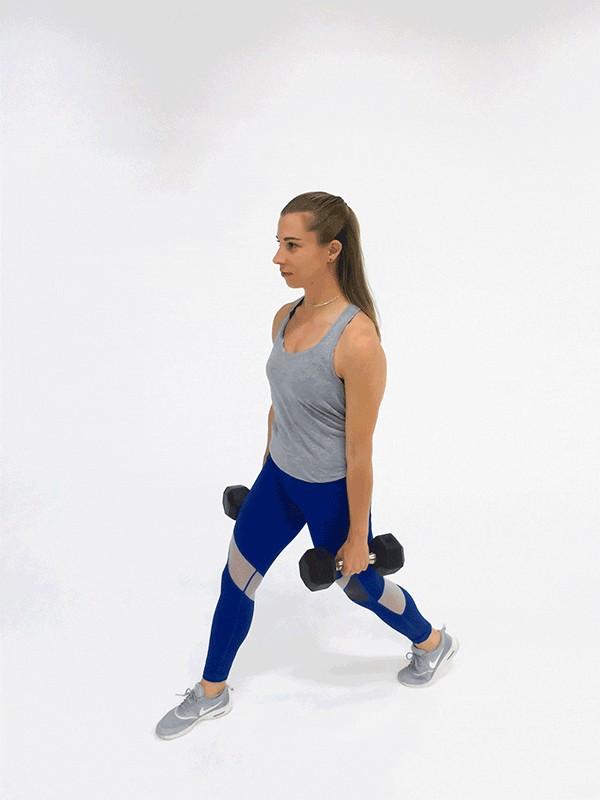
- Stand in a staggered stance with your right foot two to three feet in front of your left foot. Let your arms hang down at your sides. For more of a challenge, hold one dumbbell in each hand (as shown above).
- Keeping your chest up, back straight, and core engaged, lower yourself into a lunge position (both knees bent about 90 degrees, rear knee off the floor).
- Explode upward, driving through your heels with enough force for your feet to leave the ground.
- Switch leg positions in midair, landing softly with your left foot forward.
- Immediately lower yourself into a lunge in preparation for your next jump.
- Continue alternating legs with each rep.
9. Star jump
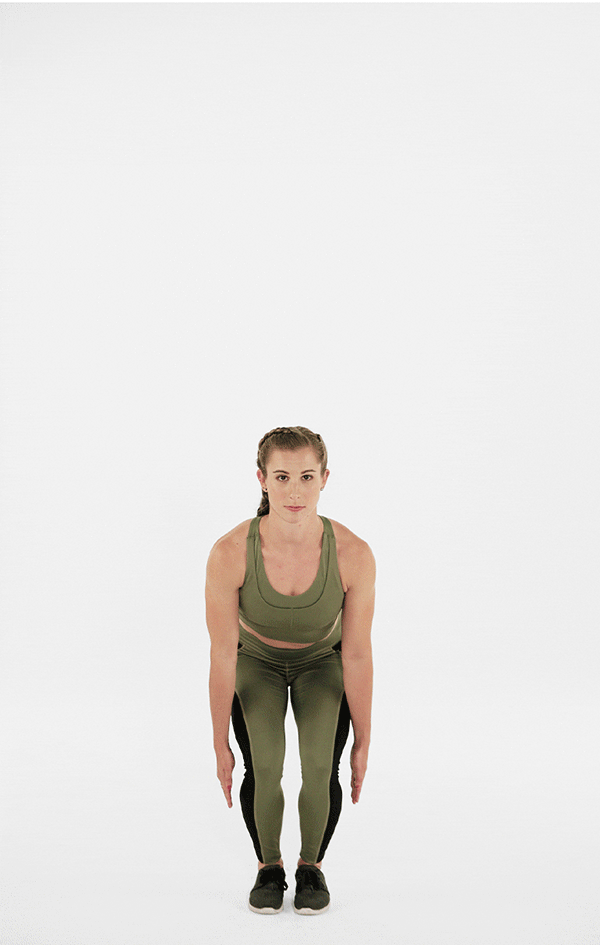
- Start in a quarter squat position with your back flat, feet together, and palms touching the sides of your lower legs.
- Jump up, raising your arms and legs out to your sides (your body should form an “X” in midair).
- Land softly with your feet together and immediately lower yourself back into the starting position.
10. Skater jumps
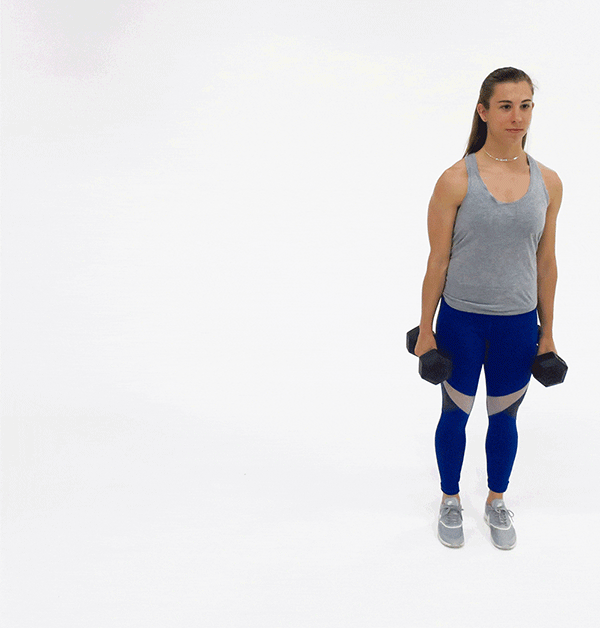
- Stand tall with your feet hip-width apart. For more of a challenge, hold a dumbbell in each hand, arms hanging down by your sides (as shown above).
- Shift your weight to your left foot. Bend your left knee and then push through your foot to jump to your right.
- Land softly on your right foot, crossing your left foot behind you as you lower your body until your right thigh is parallel to the floor.
- Pause, and then repeat the movement to your left, pushing off with your right foot and landing softly on your left foot.
- Continue alternating sides with each rep.
11. Jump rope

- Stand tall holding one end of a jump rope in each hand (the rest of the rope should be behind you). Keep your elbows close to your body and your arms bent about 90 degrees out to your sides.
- Using primarily your wrists and forearms, swing the rope over your head and down toward your feet in front of you, jumping over it.
- Continue jumping rope for the prescribed amount of time.
Is HIIT Good for Weight Loss?
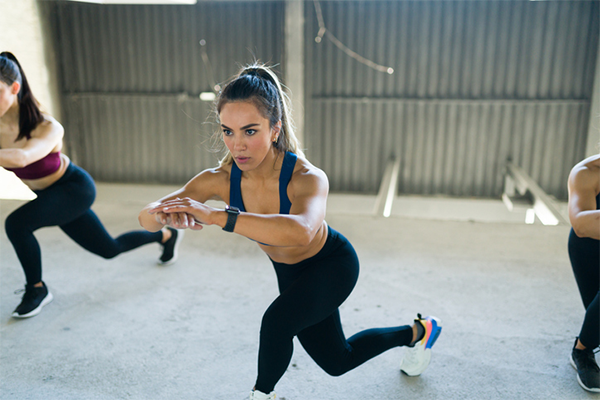
“When it comes to fat loss, few other forms of training compare to HIIT,” says Trevor Thieme, CSCS, executive director of fitness and nutrition content for BODi.
Numerous studies have found that HIIT can be even more effective for fat loss than steady-state cardio like running or cycling.
Take this International Journal of Obesity study, for example.
Regular HIIT sessions helped one group of overweight young women shed an average of 5.5 pounds of fat in 15 weeks, whereas steady-state cardio led another group of overweight young women to gain an average of one pound of fat during the same time.
One key reason why HIIT is more effective than steady-state cardio for fat-burning is that it typically requires a longer recovery period.
“Research shows that your metabolism remains elevated for up to 48 hours after a HIIT workout,” says Thieme, adding that the “afterburn effect” for steady-state cardio is much shorter (typically just a few hours).
“As a result, HIIT can help you burn more total calories.”
HIIT exercises for beginners
If you’re just beginning your exercise journey, it’s best to build a solid fitness foundation before doing HIIT.
If you don’t take the time to work up to intense exercise, you can increase your risk of injury and overtraining, Thieme says.
Once you are ready for HIIT, however, you might be surprised by how little time it takes to reap its benefits.
“You can see noticeable results doing just 10 to 30 minutes a few times a week,” Thieme says.
